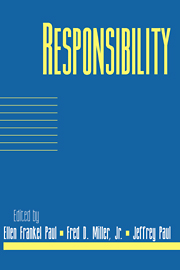Book contents
- Frontmatter
- Contents
- Introduction
- Acknowledgments
- Contributors
- Causation and Responsibility
- Negligence
- Responsibility and Consent: The Libertarian's Problems with Freedom of Contract
- The Irrelevance of Responsibility
- On Responsibility in Science and Law
- Responsibility and the Abuse Excuse
- Why Citizens Should Vote: A Causal Responsibility Approach
- Institutionally Divided Moral Responsibility
- Fate, Fatalism, and Agency in Stoicism
- Ultimate Responsibility and Dumb Luck
- Taking Responsibility for Our Emotions
- Index
Introduction
Published online by Cambridge University Press: 06 January 2010
- Frontmatter
- Contents
- Introduction
- Acknowledgments
- Contributors
- Causation and Responsibility
- Negligence
- Responsibility and Consent: The Libertarian's Problems with Freedom of Contract
- The Irrelevance of Responsibility
- On Responsibility in Science and Law
- Responsibility and the Abuse Excuse
- Why Citizens Should Vote: A Causal Responsibility Approach
- Institutionally Divided Moral Responsibility
- Fate, Fatalism, and Agency in Stoicism
- Ultimate Responsibility and Dumb Luck
- Taking Responsibility for Our Emotions
- Index
Summary
The concept of responsibility lies at the heart of a number of central questions in moral philosophy and legal theory. Under what conditions is it appropriate to praise or blame agents for their actions (or their omissions)? When is it legitimate for a legal system to hold an agent accountable for the consequences of his behavior? Are people's decisions and actions in some sense causally determined, and, if they are, is this determinism compatible with our moral and legal practices of assigning responsibility?
The essays in this volume address these questions and confront related issues. Some analyze different theories of causality, asking which theory offers the best account of human agency and the most satisfactory resolution of troubling controversies about free will and determinism. Some essays look at responsibility in the legal realm, seeking to determine how the law should assign liability for negligence, or whether the courts should allow defendants to offer excuses for their wrongdoing or to claim some form of “diminished responsibility” Other essays explore libertarian views about political freedom and accountability, asking whether libertarian positions on consent, contract law, and responsibility are consistent, or whether restitution is superior to retribution or deterrence as a basis for a theory of corrective justice. Still others examine the notion of partial or divided responsibility, or the relationship between responsibility and the emotions.
The first six essays deal with various issues relating to legal responsibility.
- Type
- Chapter
- Information
- Responsibility , pp. vii - xiiiPublisher: Cambridge University PressPrint publication year: 1999

